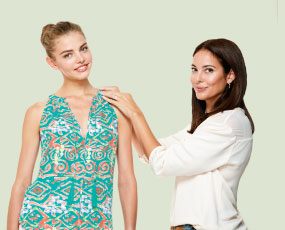In the News: Fashioning an Enterprise
Kara Schoenhaus Mendelsohn ’97 says she knows what women really want—a great blouse at a great price—and she says that’s what stores want too. The result?
The garments made by Mendelsohn’s company, Cooper & Ella, have been flying off the racks at full markup since shipping started in 2012. Fashion trade publications have taken notice. Style.com praised the designer details at low prices and suggested that other fashion entrepreneurs consider Mendelsohn’s one-product strategy.
“I focused on women’s blouses because I saw a white space in the market,” says Mendelsohn, who keeps overhead low with only six employees. “The other opportunity I saw was price point. The average contemporary designer blouse costs between $200 and $300. Ours are priced between $88 and $150. They’re the least expensive items in the most expensive stores.”

Saks Fifth Avenue is the top U.S. sales performer. Neiman Marcus and Bloomingdales also carry the line. Foreign retailers include the U.K.’s Harvey Nichols and Japan’s Sogo & Seibu.
“I knew that our disruptive price point would allow me to launch my brand and that we could scale very quickly. Now we’re adding dresses, knitwear, and bags. Our goal is to become a lifestyle brand.”
After 15 years working at Calvin Klein, Michael Kors, Marc Jacobs, and other fashion icons, Mendelsohn knows the industry. She credits her art/psychology degree with helping prepare her for a career that is based in design but steeped in desire. And staying in contact with entrepreneurial classmates like Chris Birchby ’97, founder and president of COOLA organic skin care products, Oceanside, Calif., and Ian Murray ’97, co-founder of Vineyard Vines, Stamford, Conn., broadens her perspectives.
Mendelsohn, who named the company after her children, launched an initiative in October called Empower. For every sale, the company will donate a hot meal to the Hope Foundation School Tannery Road in Bangalore, India. The goal for 2015 is 100,000 meals.
“In India, every second child drops out by middle school to work,” she says. “For many kids, this is the only full meal they get each day. Maybe it will keep them in school and learning. This takes us beyond making blouses and making customers feel good. It’s about how we can make ourselves good. It’s going to change everything for us—as a company and as people.”
—Robert S. Benchley